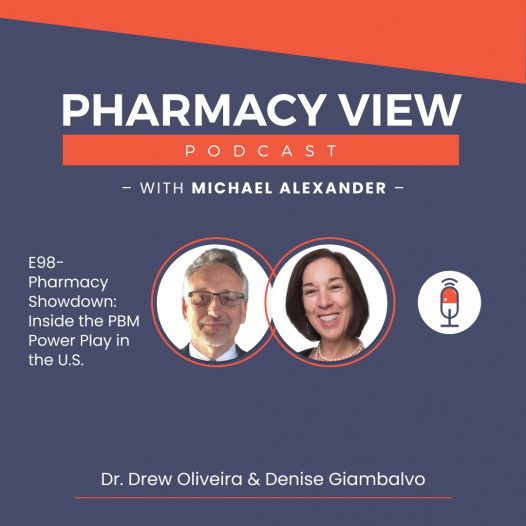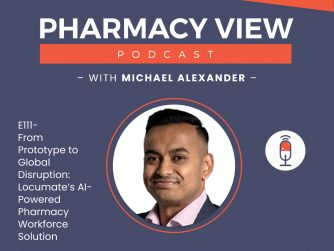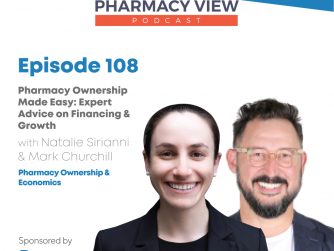In this episode of the Pharmacy View Podcast’s Rx to Riches stream, international host Michael Alexander, a Pharmacist, entrepreneur, digital health enthusiast, Co-Founder of Audirie, and the Regional Vice-President of Health Plans at Omada Health, interviews Dr. Drew Oliveira, Executive Director, Washington Health Alliance and Clinical Associate Professor, University of Washington; and Denise Giambalvo, Director, Member Engagement & Business Strategy, Washington Health Alliance. Together, they explore the intricate dynamics of the Pharmaceutical market, focusing on the impact of PBMs and the broader disparities in the U.S. healthcare system. Tune in to uncover how vertical integration, financial incentives, and payment model reforms could reshape patient care and outcomes.
Denise delves into the complexities of the pharmaceutical market, particularly focusing on the role and impact of PBMs. They highlight the dominance of three major PBMs that control 80% of the market, creating a system that often prioritizes profits over patient care. Denise explains how vertical integration enables PBMs to manipulate drug pricing, even within programs aimed at assisting low-income patients, and describes the financial challenges faced by Pharmacies due to PBM practices like clawbacks, which often result in financial losses for Pharmacies.
Denise elaborates on the challenges independent Pharmacies face due to PBMs’ vertical integration, where PBMs own Pharmacies and manage the entire supply chain. This integration allows PBMs to benefit from practices like spread pricing, where they charge health plans more than they reimburse Pharmacies, pocketing the difference. Denise underscores the lack of transparency in PBM operations and its impact on costs for both employers and patients. Additionally, the discussion covers the significant role of specialty drugs in healthcare costs and how PBMs leverage their control to profit through rebates and preferred drug listings.
Further, Dr. Drew and Denise discuss the disparities and complexities within the U.S. healthcare system, emphasizing the dominance and profit mechanisms of PBMs at various stages of the pharmaceutical supply chain. The conversation reveals how PBMs and consultants create a biased market, influencing employer choices through back-end financial incentives, exacerbating the lack of transparency, and ultimately affecting drug costs. Denise also highlights the need for data-driven strategies to address health inequities, stressing the importance of removing financial and access barriers to improve patient outcomes.
In a thought-provoking exchange, host, Michael Alexander asks Denise and Dr. Drew Rivera about the most impactful change that could improve patient care in the U.S. healthcare system. Both suggest that changing the payment model to a global or episode-based payment for primary care would be transformative. Dr. Rivera also proposes a federalized healthcare system as a controversial yet potentially effective solution for aligning incentives and enhancing care quality. The episode concludes on a lighter note, with Dr. Rivera sharing his passion for jazz music and Denise discussing their enjoyment of dancing and pickleball, highlighting the importance of balancing professional and personal interests.
Topics Covered
- Impact of Pharmacy Benefit Managers (PBMs)
- Challenges for Independent Pharmacies
- Healthcare Cost Disparities
- Strategies to Address Healthcare Inequities
- Proposed Reforms for the U.S. Healthcare System
Key Quotes (Time Stamps)
- “But the incentive to make some money on the side is pretty big. And when you have three Pharmacy Benefit Managers controlling 80% of the market, it’s kind of hard to turn back. (4:10 -4:32) – Denise Giambalvo
- “Rarely will a Pharmacist buy direct. So, they usually belong to a group purchasing organization. And so, their purchasing power is only as big as their purchasing group. So, one group might get better pricing than another. And what you negotiated six months ago on the drug may cost more now. So then here you read that this reimbursement was okay six months ago, but now ingredient costs have gone up, and now suddenly you’re paying more on that drug, and the PBM says, oops, sorry.” (8:37 – 9:30) – Denise Giambalvo
- “And no surprise, they approve the dispensing of that drug about 96% of the time. So, they put it on the formulary as a preferred drug. They get money for doing that, and then they’re in control of saying whether or not it’s appropriate for the patient to receive that right based on clinical information that the doctor sends over.” (15:52 – 16:19) – Denise Giambalvo
- “Here in the U.S., we have somewhat of a capitalistic society, and that’s not different from the healthcare space, especially as we’re talking about Pharmacy and Pharmacy benefits and how a drug actually gets to a patient.” (20:51 – 21:10) – Dr. Drew Oliveira
- “Creating a more fair and just coverage system would make a lot of sense—to make sure that things that people need are covered, that they remove those barriers right in the room; and if it’s a financial barrier, we’ve got to remove that, if it’s transportation or an access barrier, we have to remove those things so that people can actually get the care they need. That would improve productivity in the country. It would improve the cost for an individual. But overall, it should lower the total cost of care in general.” (25:55 – 26:36) – Dr. Drew Oliveira
Social Media Clips (Time Stamps)
- The Hidden Costs of Prescription Drugs: A PBM Story (3:36 – 9:30)
- Vertical Integration: The PBM Power Play Affecting Drug Prices (9:31 – 16:57)
- Health Disparities and PBMs: A Deep Dive into U.S. Healthcare Inequities (17:17 – 27:04)
- From Widgets to Wellness: A New Vision for Primary Care Payment (27:07 – 29:43)
Useful Links
Washington Health Alliance | LinkedIn








